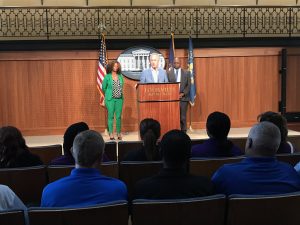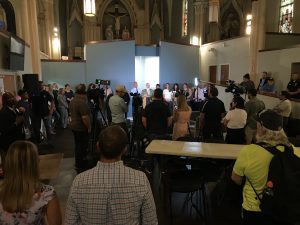Louisville Mayor Greg Fischer’s administration, Kentucky Juvenile Justice Commissioner Denny Butler, representatives of the Administrative Office of the Courts, and Jefferson County Sheriff John Aubrey today outlined the tentative agreement for the transition of care for detained Louisville youth to the State Department of Juvenile Justice in light of the approaching December 31st closure of the local facility resulting from this year’s Metro budget reductions.
Points include:
- Effective Jan. 1, 2020, the State Department of Juvenile Justice will be responsible for youth detainment in Jefferson County, as it is for all other counties in Kentucky.
- As part of this shift, youth who are arrested by police in Jefferson County will initially be taken by the arresting police agency to meet with a court designated worker for an assessment and recommendation to the Juvenile Court Judge, who will determine if the youth should be detained until a court appearance.
- If they are to be detained, the arresting agency will take them to the state’s Audubon Youth Development Center, 8711 La Grange Road, in eastern Jefferson County, where they will be held until their arraignment and detention hearings. Metro staff will transport pre-adjudicated youth.
- If the court detains a youth, the Sheriff’s office will transport them to one of the state’s other youth detention facilities, outside Jefferson County.
The closing of Youth Detention Services (YDS) is one of many steps that Louisville Metro Government is taking as part of the FY 2019-20 budget cuts, which are in response to an increasing state pension obligation and a Metro Council vote last spring against new revenue.
The city had considered turning YDS back to the state months ago in response to the budgetary challenges but because of the complexities of unwinding the current system, rebuilding a new one, and concerns of equity, the Mayor included another year of funding in his FY20 budget proposal while contract discussions with the state continued. In June, however, Metro Council appropriated only a half-year funding, which expedited the process.
Running the detention center currently costs the city about $9.7 million annually. While the state has been paying the city a per diem based on the number of detained youths, that subsidy has declined, and the city has been drawing only about $1.6 million annually.
As part of the new agreement, the city will contribute to the cost of expanding and operating a portion of the Audubon facility. The state will operate this hybrid, short-term facility and will expand the current alternative placement services.
During today’s meeting, officials asked members of the Advisory Committee for their input as they work to ensure as smooth a transition as possible, and to mitigate the impact on youth and families.
The Juvenile Justice Advisory Committee members include local, state, and federal juvenile justice leaders, government officials, and community partners, who seek to develop programs, strategies and recommendations that are consistent with state law, core requirements of the Juvenile Justice and Delinquency Prevention Act, core strategies of the Annie E. Casey Foundation’s Juvenile Detention Alternative Initiative, and the reduction of Disproportionate Minority Contact throughout the juvenile justice system.
Mayor Fischer today thanked the committee for their input, and thanked the state, judges and court officials, the sheriff and his Metro Government team for their work on the transition plan. He also expressed his deep gratitude for the work of YDS Director Dr. Ursula Mullins and her team.
“Youth detention is a challenging environment under normal circumstances, and I know the uncertainty of recent months have made it even more difficult. I greatly appreciate the hard work and commitment of Dr. Mullins and her team,” the Mayor said. “Our city deeply appreciates her bravery and compassion.”
The Mayor added that his administration’s goal has been to ensure as smooth a transition as possible for the youth and their families, the criminal justice system and the dedicated and hardworking employees of YDS.
“This was not an easy decision, and we know that it will place a burden on some families in our community,” the Mayor said. “Our hope is that this focus on youth detention by all stakeholders, including city and state officials, as well as police and the justice system, will result in more innovative and compassionate approaches to working with troubled youth, and avoid more costly detentions.”
“As we face tough discussions about what is next for our youth and our employees, I am humbled to work side-by-side with our committed staff who advocate for our youth,” said Dr. Ursula Mullins, Director, Youth Detention Services. “I want to thank our YDS family who have worked in a situation of uncertainty for months and have continued to show their dedication to Louisville youth and families.”
“I’m very pleased to see that the state and Metro Government have been able to come to terms to provide services for the children in YDS,” said Metro Council President David James. “While I’m personally not pleased to see YDS shut down, this is the reality we are faced with.”

Photo: Louisville Metro Council
Councilman Pat Mulvihill (D-10) is sending praise to the community for giving an assist to Solid Waste Management Enforcement (“SWMS”) Officers as they tracked down and impounded the tenth vehicle of 2019 involved in illegal dumping.
“My thanks to everyone who helped SWMS find those who would try to turn our neighborhoods into their own personal dumping grounds,” said the Councilman. “My thanks also to SWMS officers who continue to make illegal dumping a priority. We, on the Metro Council, want to send a strong message if you illegally dump in our neighborhoods, it will be costly when we catch you.”
The Ford Ranger truck with by two individuals was caught on a residential security camera in the Schnitzelburg neighborhood. They were seen dumping a couch on the property.
Unfortunately, the license plate was not visible in the video. Still shots from the video were posted on the weekly District 10 Enewsletter, the Louisville Metro Public Works Facebook page and on Nextdoor asking the community to help identify the individuals.
SWMS Officers received an anonymous tip that led them to the owner of the truck in District 21. The owner stated that he planned to dispose of the couch for free at the Waste Reduction Center, but he didn’t realize it is closed on Mondays. Instead of waiting another day, he dumped it on someone else’s property.
The total cost of a citation for illegal dumping is approximately $750 plus the vehicle will be impounded and the owner will be required to pay all storage fees.
 Mayor Greg Fischer today celebrated the announcement that the Parking Authority of River City (PARC) was named an Accredited Parking Organization with distinctions, ranking it among the top 5 percent of parking organizations worldwide.
Mayor Greg Fischer today celebrated the announcement that the Parking Authority of River City (PARC) was named an Accredited Parking Organization with distinctions, ranking it among the top 5 percent of parking organizations worldwide.
“This designation confirms that PARC not only has a well-run parking program, but through its progressive practices and innovation, PARC also meets the highest end of standards for parking organizations globally,” the Mayor said. “Congratulations to PARC director Tiffany Smith and her fantastic team on this accolade!”
The Accredited Parking Organization designation standards are set by the International Parking & Mobility Institute (IPMI), which recognizes best practices in responsible parking management and operations, customer service, professional development, sustainability and access management, safety, data security and risk management, and more. The accreditation is awarded for a three-year period.
“It’s quite an achievement, which follows a lengthy and arduous review process,” explained Shawn Conrad, CAE, CEO of IPMI. “Parking at an accredited facility or operation assures the public that the parking organization adheres to a strict code of ethics and meets national and internationally endorsed standards for professionalism, accountability, responsibility, and performance – and we are thrilled to recognize the Parking Authority of River City.”
In order to achieve the status of Accredited Parking Organization with distinctions, PARC had to meet more than 185 criteria in more than 14 categories. PARC and contractor REEF Parking began the process seeking the accreditation with distinction in January.
“This is a testament to the great work the PARC staff does every day to provide convenience in parking, asset management, and superior customer service,” said Tiffany Smith, director of PARC. “Whether it’s the LED lighting, our 24-hour call center, cleanliness, or clear wayfinding signage, our team strives to stand out among the city’s parking options and find innovative ways to serve our customers through new technology.”
In addition to the accreditation with distinction, three Louisville PARC garages – Clay Commons, Glassworks and Jefferson Center – were designated as “Premier Facilities” by IPMI after meeting 43 criteria in categories including signage, lighting, cleanliness, and efficiency.
Metro Council President David James said, “I’m very proud of the men and women of PARC for achieving this level of certification, it speaks highly of Ms. Tiffany Smith and her team.”
Metro Council member David Yates said, “Now more than ever it’s imperative that the Metro Council work with PARC, the administration and staff to expand resources, continue to improve efficiencies and ultimately increase the amount of revenue generated to ensure Louisville’s solvency.”
 Family-friendly activities that include crafts, music and games will be part of Archaeology Day at Wickliffe Mounds State Historic Site on Sept. 21.
Family-friendly activities that include crafts, music and games will be part of Archaeology Day at Wickliffe Mounds State Historic Site on Sept. 21.
The day – part of Kentucky Archaeology Month — will feature demonstrations and hands-on educational activities about archaeology for the whole family from 10 a.m. to 4 p.m.
Activities include a mock excavation for kids, artifact laboratory station, spear and atlatl throwing, stickball game area, flint knapping, bow and arrows, finger weaving, basket weaving, corn shuck dolls, a drum circle and make and take home a pottery craft.
This event is sponsored in part by the Kentucky Heritage Council. Entrance to the activities is included in the museum admission of $5 for adults and $4 for kids, seniors and military. Parking is free. For more information, call the park office at 270-335-3681 or email carla.hildebrand@ky.gov .
Wickliffe Mounds is an archaeological site of a Native American village of the Mississippian culture. The park features a museum, mounds, walking trail, picnic area, visitor center with tourism information and a gift shop. The park is located along the Mississippi River’s Great River Road National Scenic Byway at 94 Green Street, Highway 51-60-62, Wickliffe, Ky. For more information about this and other Kentucky State Parks, visit www.parks.ky.gov
Last week, Mayor Greg Fischer joined Metro Councilwoman Barbara Sexton Smith and community members to unveil a new public art project, the Louisville Knot.
Through a series of bent and bundled steel tubes, the Louisville Knot transforms the Ninth Street highway underpass that connects Museum Row to west Louisville into a welcoming pedestrian thoroughfare. The installation, which is illuminated at dusk, serves as an interactive sculpture and street furniture that can be used as seating, tables, a bike rack, and an extra-large swing.
“For too long, we’ve allowed an imaginary distinction to exist between downtown and west Louisville along the Ninth Street corridor. By activating this previously underutilized space, the Louisville Knot welcomes residents and visitors to explore the corridors leading to the Portland and Russell neighborhoods,” the Mayor said. “I’m delighted to already see people of all ages and backgrounds coming together at the Louisville Knot.”
The Louisville Knot came out of a call for proposals from Louisville Metro Government and Louisville Downtown Partnership seeking a project that combined art, design, and infrastructure. The design team is led by Philadelphia-based Interface Studio Architects (ISA) with fabrication by Louisville’s Core Design.
“The Knot project was a special opportunity for ISA to get to know a city – its history and people – and devise a unique intervention to help enliven an underutilized piece of urban fabric. We hope the installation not only reinforces the Main Street link across two neighborhoods but motivates creativity, sharing, and social connections among the broadest range of people who live in and visit Louisville for many years to come,” said Brian Phillips, ISA Principal.
The project was funded by Louisville Metro Government and the Rotary Club of Louisville.
“For 107 years, the Rotary Club of Louisville has supported worthy causes in our community,” said Luke B. Schmidt, Rotary Club of Louisville president. “The Club is focused on ‘Connecting our Community,’ and we believe the Louisville Knot’s location will help build a bridge as we work to eliminate the Ninth Street Divide.”
 Mayor Greg Fischer joined with Metro Council members and community outreach representatives yesterday to announce the initiatives that will receive Louisville Metro Government funding to continue addressing the needs of homeless individuals and families in the city.
Mayor Greg Fischer joined with Metro Council members and community outreach representatives yesterday to announce the initiatives that will receive Louisville Metro Government funding to continue addressing the needs of homeless individuals and families in the city.
Building on work started early in 2019 when the city allocated $500,000 for programs, the plan provides $1 million from the city’s FY20 operating budget toward initiatives chosen in collaboration with the Coalition for the Homeless to align with the eight recommendations outlined in the University of Louisville study, “Solving Street Homelessness in Louisville, Kentucky,” released in June.
“Louisville, like many American cities, has seen a rise in unsheltered homelessness in recent years and an increase in homeless encampments. We’ve made clear progress but there’s more work to do to ensure that every Louisvillian has a place to call home,” said Mayor Fischer said, adding that, “There is no one-size-fits-all solution. We have to help our homeless population deal with and overcome their challenges one person at a time. That’s what a compassionate city does.”
The allocations include:
- Funding to move the transitional storage launched at a temporary location in March 2019 to a permanent location at the Salvation Army that will have expanded hours. The storage provides a place where individuals experiencing homelessness can store their belongings when going into shelter.
- Three options for low-barrier shelter beds via St. Vincent de Paul, Wayside Christian Mission, and the Healing Place.
- Continued funding for rapid rehousing services and emergency shelter for homeless families, provided by Volunteers of America.
- Ongoing street outreach teams enhanced by social workers and other professionals who can provide behavioral and mental health counseling, drug and alcohol addiction assessments and counseling services, as well as legal expertise.
- And the University of Louisville is given the task of evaluating the effectiveness of the individual programs in this initiative.
The newest round of funding is part of work begun in fall 2017 when Mayor Fischer created the Homeless Encampment Task Force, chaired by Eric Friedlander, director of the Office of Resilience and Community Services.
That team helped inform decisions made about the funding allocations in January, which resulted in these outcomes:
- Wayside has provided 19,607 nights of lodging to a total of nearly 740 different people since opening its low-barrier shelter.
- Nearly 240 people have found a safe, secure place to store their belongings at the storage units temporarily operated by St. John Center.
- Nearly 500 clients were served by outreach teams from the St. John Center & UP Louisville.
- The Healing Place added 24 low-barrier shelter beds, and Volunteers of America served 17 families through various rapid rehousing paths and 63 families at family emergency shelter.
“We know that no one idea will address the multiple issues impacting people who are homeless, nor the complex needs of this diverse population,” said Friedlander. “That’s why I am so appreciative of the work, expertise and understanding of our partners, including organizations that are part of the coalition, and the street outreach groups that engage people where they are. Working together, we’ve shown we can make a difference.”
Metro Councilman Bill Hollander (District 9) said: “This funding builds on the work we started in January. It provides shelter for men, women and families and also funds outreach workers who can help address the root causes of homelessness. Even as Louisville Metro deals with a very difficult budget, we can’t ignore the needs of our neighbors experiencing homelessness.”
Councilwoman Barbara Sexton Smith (District 4) said: “Our local government is focused on implementing common sense solutions for the complex challenges surrounding those experiencing homelessness. I have stated several times before, there is room for everyone to step up and help. In addition to the more than $1.5 million made available during this past year we still need more businesses, nonprofit organizations, healthcare, education and the interfaith communities to reimagine their roles and create common sense solutions that will produce real results for real people needing assistance because this is our reality.”
Friedlander added that the city also provides support to issues that directly affect homelessness, including $41 million invested in affordable housing over the past four years, implementing a plan to battle substance-use disorders, and directing $1.5 million in federal funding to local agencies such as the coalition, Volunteers of America, St. John Center and Wayside.
“The Coalition for the Homeless is so excited to see the city’s commitment to addressing the needs and best practices identified in the University of Louisville ‘Solving Street Homeless in Louisville, Kentucky’ Study,” said Natalie Harris, Executive Director of the Coalition for the Homeless. “We know these important programs saved lives over the last six months and are excited to see them extended and improved.”
The U of L report, “Solving Street Homelessness in Louisville, Kentucky,” was the result of a five-month long assessment study that outlined the process of applying best practices to Louisville’s Continuum of Care (CoC), a process developed by the U.S. Department of Housing and Urban Development (HUD) that helps communities across America address the problems of homelessness in a coordinated, comprehensive and strategic way.
 Special programs at the Salato Wildlife Education Center in Frankfort will celebrate the beginning of the monarch butterfly’s annual migration south. Participants can learn more about these valuable pollinators and receive expertise and advice on gardening for Kentucky’s native pollinators on Saturday, Sept. 7 at the Salato Center.
Special programs at the Salato Wildlife Education Center in Frankfort will celebrate the beginning of the monarch butterfly’s annual migration south. Participants can learn more about these valuable pollinators and receive expertise and advice on gardening for Kentucky’s native pollinators on Saturday, Sept. 7 at the Salato Center.
The event will feature activities suitable for individuals of all ages, including butterfly crafts, face painting, a monarch tagging demonstration and waystation tours, and a nectar plant and milkweed sale (while quantities last). Butterfly costumes are welcome.
Salato Center staff also will unveil a new Monarch Waystation at the event. This waystation will be dedicated to the late Mary Carol Cooper, who served as director of Salato’s Native Plant Program from 1992 to 2012.
Activities and demonstrations will run from 10:30 a.m. to 3 p.m. (Eastern Time) and are free with paid admission into the center. The center features native wildlife in naturalized enclosures, conservation exhibits and paved walking trails through a variety of habitats.
For a detailed list of activities and times, contact the Salato Center at (502) 892-4460.
The center is located off U.S. 60, approximately 1½ miles west of the U.S. 127 intersection. Look for the bronze deer statue at the entrance of the main Kentucky Fish and Wildlife campus.
Except for select events, hours are 9 a.m. to 5 p.m. Tuesday through Friday, and 10 a.m. to 5 p.m. Saturday. Salato is closed on Sunday, Monday and state holidays.
Except for select events, admission is $5 for adults and $3 for youth 5 to 18. Children four and under are admitted free. The center also offers annual memberships for individuals and families.
 Weather
Weather Traffic
Traffic @LouisvilleDispatch
@LouisvilleDispatch @LouisvilleDisp
@LouisvilleDisp Subscribe
Subscribe
